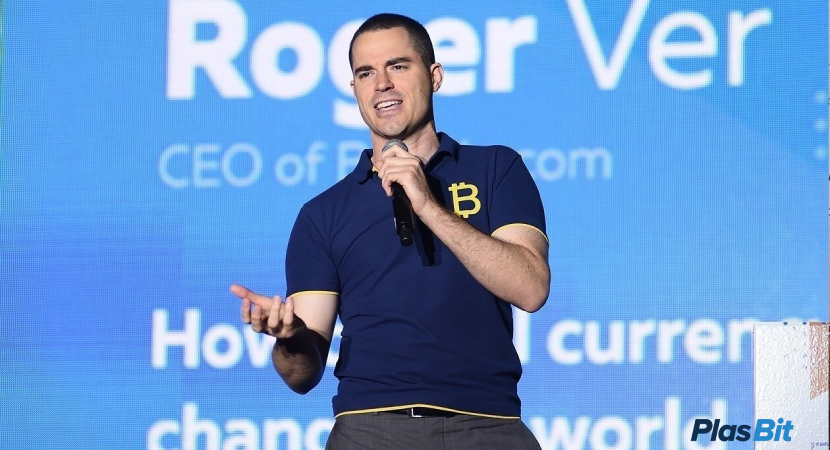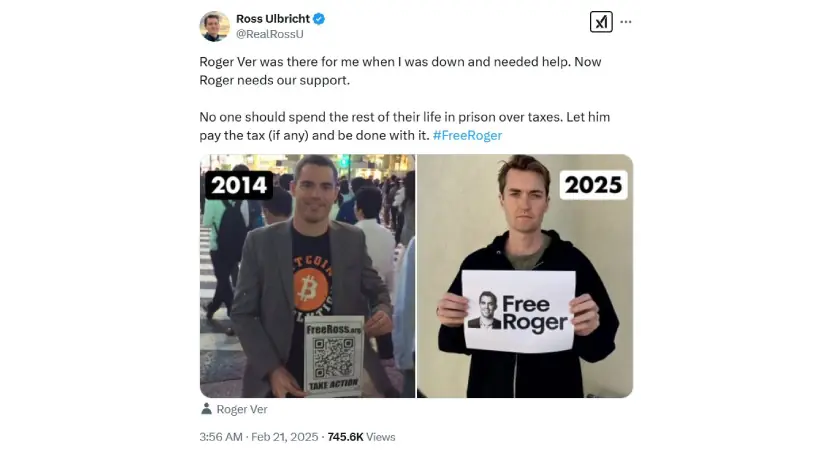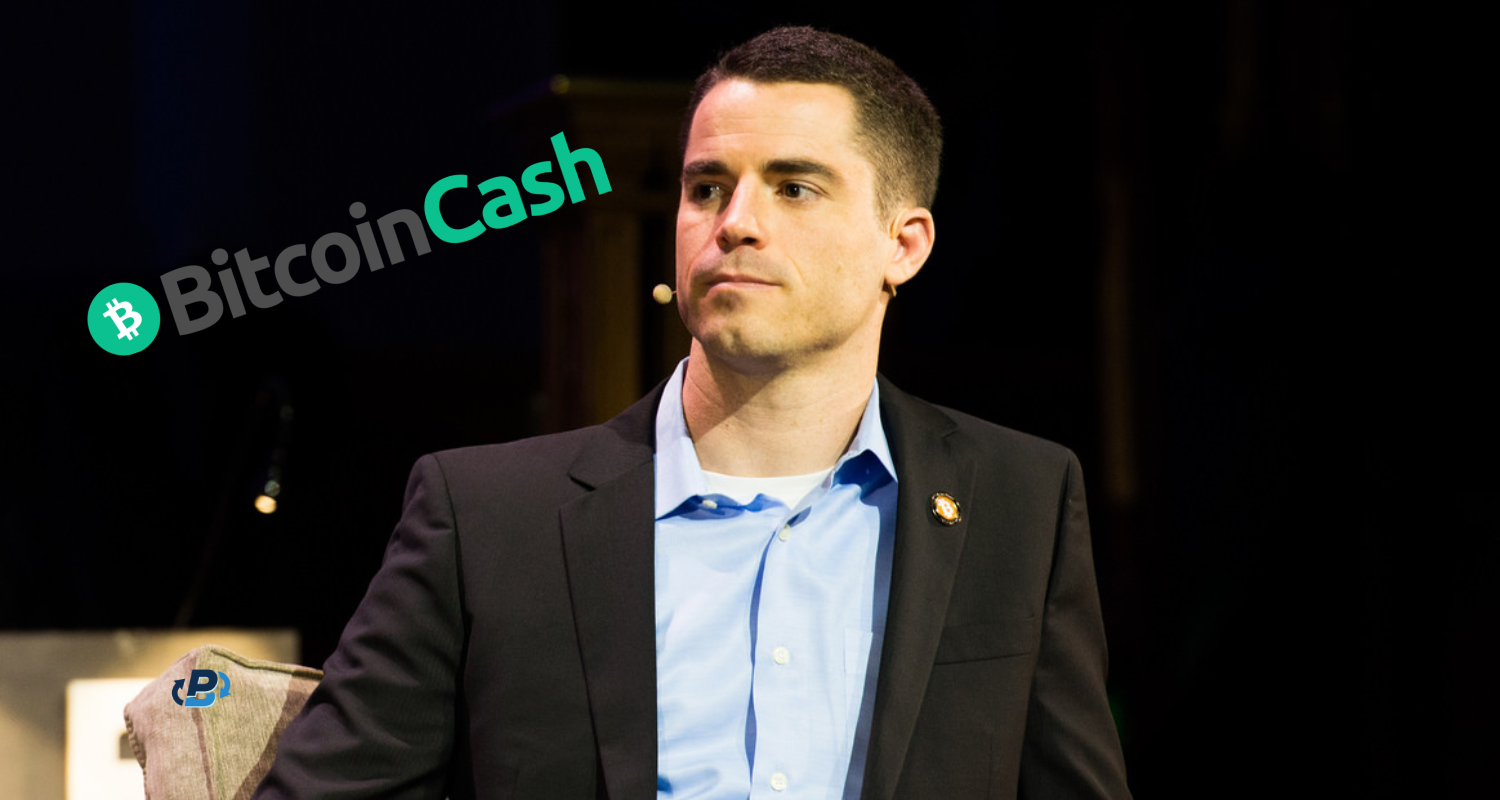During its early days, Bitcoin attracted a crowd of colorful, controversial, and charismatic characters, further amplifying the chaotic nature of cryptocurrency. Due to its extreme volatility and unconventional nature, Bitcoin was dismissed by many as just a passing fad. But for those who believed in the concept of decentralization, it was so much more, representing an idea that couldn’t be stopped. Of those believers, few stood out more than the man who came to be known as Bitcoin Jesus. But who is Roger Ver? An early Bitcoin advocate and investor who was indicted by a U.S. federal grand jury for fraud and tax evasion, Ver was arrested in Spain on April 28, 2024 and released on bail. He’s currently in Mallorca while awaiting an extradition decision, and has appealed to U.S. President Donald Trump for a pardon. Elon Musk, heading the Department of Government Efficiency, responded that Ver had renounced his U.S. citizenship, saying that a pardon was unlikely. Known for his vocal support of Bitcoin, Ver has founded or been involved in numerous Bitcoin-related projects, including MemoryDealers.com, PassportsforBitcoin.com, Bitcoin.com, the Bitcoin Foundation, as well as early investments in Kraken, Purse.io, Blockchain.com, Bitcoinstore.com, Ripple, BitPay, and BitInstant.
Crypto’s First Prophet
Not much is known about who is Roger Ver prior to his involvement with Bitcoin. Born in San Jose, California in 1979, he attended Valley Christian High School before moving to De Anza College for one year. Ver’s personal website states he founded a company called MemoryDealers.com in 1999, at the age of just 19 years old, dropping out of college shortly afterwards to focus on running the business full time. He claims to have grown MemoryDealers (which sold second-hand Cisco networking gear) to become a “market leader”, generating millions of dollars in revenue by the time he was in his early twenties. In 2005, Ver left the U.S. and resettled in Japan, where he began designing and manufacturing optic transceivers with a startup called Agilestar.com, selling them to multiple Fortune 100 companies and growing his fortune.

The world’s very first billboard advertising Bitcoin as a means of payment
It was these endeavors that allowed Ver to invest so enthusiastically in the early Bitcoin movement that arose after Satoshi Nakamoto unleashed his innovation on the world in late 2009. Ver relates that he first learned about Bitcoin in early 2011, when it was worth less than $1 per coin. Having read the Bitcoin whitepaper, he said it was “one of the most important inventions in human history”, and his company MemoryDealers became the first in the world to accept BTC as a method of payment. It was around the same time that he began accumulating a stack of Bitcoin that would soon number more than 400,000 coins. While simultaneously buying more and more BTC, Ver threw himself into the crypto industry that was emerging alongside it. Together with Charlie Shrem, he started one of the first crypto native companies called BitInstant, while investing in other initiatives such as the crypto exchange Kraken, the global payments settlement company Ripple, and crypto wallets such as Purse.io and Blockchain.com. He was quickly recognized as one of the biggest advocates of Bitcoin, earning himself the “Bitcoin Jesus” nickname. An extremely busy man, Ver also got involved with the Bitcoin Foundation, which is a nonprofit organization focused on improving Bitcoin’s public image, and Bitcoinstore.com, which was the first online store in the world that sold products and services for Bitcoin.
Abandoning Bitcoin and Launching Bitcoin Cash
Ver is best known for his involvement with projects like Bitcoin Cash, which is a cryptocurrency forked from the original Bitcoin blockchain, aiming to be faster and more cost-effective transactions than Bitcoin. He was also the owner and operator of the popular Bitcoin.com website, which offers crypto services including a non-custodial wallet, news portal, and more. Having advocated heavily for Bitcoin in its early days, Ver later started pushing for changes to be made to its underlying code. In 2016, In 2016, during what became known as the Blocksize Wars, he joined forces with a minority of crypto developers arguing for a hard fork of Bitcoin, one that would radically alter its underlying protocol. He called for an increase in Bitcoin’s block size, arguing that this would enable BTC to be used as payment for goods and services with reduced fees. But there was great opposition to this proposal, with critics saying it would have a negative impact on Bitcoin’s decentralization. Ver eventually emerged as one of the OG cryptocurrency’s harshest critics, saying in a 2017 interview that he was “really concerned about the future” of Bitcoin. He claimed that there was too much speculation around BTC for it to remain practical as a currency, saying that developers had “destroyed” its utility as money.
Ultimately, Ver failed to win over the majority of Bitcoin developers. Many asked themselves, who is Roger Ver to make such demands? In response, Ver and a band of like-minded allies joined forces and forked Bitcoin anyway, creating a rival cryptocurrency known as Bitcoin Cash or BCH. Many years later, in a 2023 interview, Ver told Tucker Carlson that the true motive for creating BCH was his belief that U.S. intelligence had set out to damage the original Bitcoin, manipulating online forums such as Bitcointalk.org to suppress conversations around scaling Bitcoin globally, and push it towards becoming a more speculative asset, in an effort to minimize the disruption to traditional fiat-based systems. Bitcoin, he said, had effectively been hijacked by the U.S. and other governments, and he was now ashamed to promote it. For instance, Ver said that El Salvador, which was the first country in the world to legalize Bitcoin but has since become increasingly authoritarian, was also looking to exploit Bitcoin. There, Ver said, most Salvadorian citizens are using custodial accounts operated by companies with ties to the government, which means they can be frozen at any moment. “This is the exact opposite of economic freedom,” Ver said.
Roger Ver Ripple & The Rise Of XRP
As an early investor in Ripple and XRP, Ver’s nickname “Bitcoin Jesus” masked the fact that he was much more than just an early advocate of Bitcoin. In fact, he was one of the first believers in the idea of a wider ecosystem of cryptocurrencies, and spent a lot of time and money promoting various promising crypto projects based on so-called altcoins. Perhaps the most prominent of these was Ripple, the company behind the XRP cryptocurrency, which offers a blockchain-based system for speeding up and reducing the cost of international money transfers. The connection between Roger Ver Ripple is because he invested in the company in its early days, due to his support of the technology it offered and its potential uses. David Schwartz, the CTO of Ripple, described Ver as "one of the nicest and most genuine people" he has ever met, adding that "he was a huge net positive to both Bitcoin and the world for a long time." Alongside that, he also stated that Ver's connection to Ripple was a significant factor in the problems the US government had with the platform. When talking about who is Roger Ver, it’s important to note that he was not just an early backer of Ripple. He was its second employee after founder Jed McCaleb, and he put up the funds required for Ripple to become incorporated as a U.S. company. He’s also believed to have paid the salary of another early employee, Schwartz, who actually conceived of and created XRP and its underlying blockchain. Without Ver, it may well be that XRP never went on to become the force it is today, the fourth-largest cryptocurrency by market cap

Is Roger Ver a U.S. Citizen?
The question of Ver’s citizenship is one that has come under quite a bit of scrutiny, because he is believed to have given up his U.S. passport primarily for controversial reasons and claims that he faced persecution in his home country. That’s why a lot of people ask, is Roger Ver a U.S. citizen? No, he currently holds St. Kitts and Nevis citizenship, after denouncing his U.S. citizenship in 2014 due to disagreements with the government, which occurred after he was accused of selling illegal explosives. He is currently under arrest in Madeira, waiting to be extradited to the U.S. after being indicted for tax evasion following the denunciation of his U.S. citizenship. Ver’s decision to flee the U.S. has since caused him some trouble, and he hit the headlines in 2015 after his application for a visa to visit the country of his birth was denied by the U.S. embassy in Barbados on the weak suspicion that he might not leave the country and instead go underground as an illegal immigrant. He later did manage to secure a U.S. visa and visited the country to attend a Bitcoin conference, but that was not the end of his passport troubles. Later, in 2019, he was reportedly denied a visa to visit Australia, which perhaps explains why he also became a citizen of Antigua and Barbuda in 2020, to secure Visa-free travel to more countries.
Clashes With The Crypto Community
Many in the crypto community believe that Ver fled the U.S. to escape from the potential threat of law enforcement investigations, and an infamous thread on Reddit’s r/bitcoin thread drew attention to a number of allegations thrown at Bitcoin Jesus over the years. The post, by an anonymous user called “ayanamirs”, provides a long list of allegations against Ver. For example, it pointed to public statements from Ver that he intends to promote Bitcoin Cash as “Bitcoin”, potentially misleading investors. It also cited his public reassurances that "Mt. Gox is totally fine”, just days before its collapse, which was the biggest cryptocurrency exchange failure in history, causing investors to lose millions of dollars in funds. There were also claims of vote manipulation, censorship on the r/btc Reddit thread he moderated, buying social media accounts to push his agenda, buying likes on Twitter and various other lies and manipulations.
Ver quickly responded to these allegations, which he believes were related to the bitter divisions in the Bitcoin community back in those early years. In a video on YouTube posted in response to the r/bitcoin thread, he did not attempt to hide the fact that he does, indeed, intend to promote Bitcoin Cash as Bitcoin, and argued that he’s doing so because it has more “Bitcoiness” than Bitcoin itself, before daring anyone to challenge him on that view. As for Mt. Gox, Ver said he had the privilege of visiting its offices when the crisis around fiat withdrawals first unfolded, before the exchange halted operations. He explained how he was shown accounts linked to the company that had more than $150 million available, in addition to a letter explaining that it was only allowed to facilitate ten international wire transfers per day, and around $1 million worth of domestic withdrawals per day. Although Mt.Gox was experiencing problems at that time, Ver claims that he was led to believe that it was financially secure, and explained that no one at the time was especially concerned over its stability or feared that it might collapse. That said, he admitted that the statements he made regarding Mt.Gox were later proven wrong, adding that he regretted making them and was very sorry that many people had lost money due to its collapse. Ver also commented that the claims of censorship on r/btc were one of the most laughable of all the accusations, saying that this stemmed from a simple disagreement with a former moderator over their moderating styles.

Roger trying his best to defend his honor
What Is Roger Ver Net Worth?
It seems apparent that Roger Ver, as one of the earliest Bitcoin millionaires, remains a very wealthy man, but it’s hard to put an exact number on his riches. That’s because crypto is notoriously difficult to trace, and the fact that most of his wealth is likely held in digital assets. However, most estimates say Roger Ver net worth is rumored to be around 350,000 Bitcoin, which is worth around $38 Billion as of May 2025. This does not include his Bitcoin Cash holdings and stakes in successful crypto companies. Keep in mind that most of his holdings are in crypto, so it's really difficult to assess how much he is actually worth due to the private nature of crypto holdings. The difficulty of estimating Ver’s net worth, as with most crypto personalities, is that it’s impossible to know for certain how many wallets he holds the keys to. That said, Ver was obviously one of the earliest Bitcoin whales, and he’s likely to own many other cryptocurrencies besides Bitcoin, having been an early investor in Ripple and many other projects, as well as one of the founders of Bitcoin Cash, so he likely also continues to possess XRP, BCH and several other cryptocurrencies. Due to his transition from Bitcoin advocate to oppositionist, it’s possible that Ver has offloaded many of his BTC. That said, other sources estimate he could still have thousands of BTC held in various wallets. Regardless, Ver’s fortune is likely to fluctuate considerably given that the vast majority of his wealth continues to be stored in crypto, which has never quite been able to shake off its extremely volatile nature, even as it has become much more established. Certainly, Ver has enough cash set aside that he’s more than willing to donate to what he believes are good causes. In late 2013, he notably gave the Foundation for Economic Education a donation of $1 million worth of Bitcoin. And in 2021, he donated around $2 million in BCH to the same organization.
Legal Troubles: Roger Ver IRS Case
Roger Ver’s legal problems are the subject of much discussion and many headlines, and they actually date back to before the rise of Bitcoin. Originally, he was convicted of selling explosives on the e-commerce website eBay in 2002. The Roger Ver IRS has indicted Ver with three counts of mail fraud, two counts of tax evasion, and three counts of subscription to a false tax return, due to not paying the amount of taxes he allegedly was supposed to pay on his Bitcoin assets after denouncing his US citizenship. The IRS claims that Roger Ver owes at least $48 million in unpaid taxes. There’s no doubt Ver will be counting on his wealth and his influence to get him off the hook from his latest criminal charges. Last year, after several years in which little was heard about Ver’s activities, he hit the headlines once again due to his arrest by the Spanish authorities at the request of the U.S government. Ver denies the accusations, but the U.S. authorities are currently seeking his extradition back home to face the charges. The legal accusations stem from claims that he failed to report capital gains on the sales of Bitcoin assets and the undervaluation of two companies, linked to his renunciation of U.S. citizenship in 2014. The charges allege that Ver hid 131,000 BTC, which was later sold for approximately $240 million in 2017, resulting in unpaid taxes estimated at around $48 million.
Ver is fighting the U.S. extradition request, claiming that he followed his legal counsel’s guidance when fulfilling his tax obligations. He further says that he should not be subject to any additional taxation as he was not a U.S. citizen when he sold the Bitcoin in question. His defense says the DOJ’s case is reliant on “outdated information” and is further complicated by the unclear tax laws at the time. Further, his lawyers argued that the U.S. prosecution violated his legal rights, and in the interview with Carson, Ver claimed that the charges are just the latest in an ongoing persecution campaign waged against him by the U.S. government, saying that certain people are angry at him for “not kissing the ring”, so to speak.
Will President Trump Help Ver?
The outcome of Ver’s current legal struggles remains unclear, but he has gotten some powerful allies on his side in the fight against the U.S. government. Earlier this year, it was reported that he’d hired the assistance of the one and only Roger Stone, the former advisor to U.S. President Donald Trump. Stone has reportedly been advocating for Ver since February, but it’s not clear if he has reached out to his former employer. Ver himself has raised the prospect of seeking a Presidential pardon, citing how former Silk Road founder Ross Ulbricht was freed from a life sentence just days after Trump walked back into the White House last January. As part of that initiative, he has created a website called freerogernow.org, as well as a petition calling for the charges against him to be dismissed. If Trump ever finds himself asking who is Roger Ver, he should learn the answer soon enough, because Ver has plenty of supporters that know Trump, with the likes of Ulbricht, Ethereum founder Vitalik Buterin and Tucker Carlson all on his side. Some are even closer to Trump. For instance, the President’s second wife Marla Marples has also advocated for the charges against Ver to be dropped.

Ross showing solidarity with the Bitcoin Jesus
That said, not all of Trump’s proteges are believed to be supportive of Ver. One key exception appears to be Elon Musk, who stated that he doesn’t believe Ver should be pardoned as he is no longer a U.S. citizen. It would be very ironic if Ver’s decision to forsake his U.S. citizenship in order to free himself from the long arm of the U.S. government ultimately becomes the reason for his downfall.

No pardon for you!
All told, it’s fair to say that Ver is a pretty complex and most definitely very fascinating individual. Like many, this author was of the opinion that Bitcoin Jesus was a shady character indeed, like so many in the crypto sphere. But after researching his history, it’s clear that the reality is neither black nor white, and while Ver may sometimes have suspect motives and goals, his commitment to building a world where crypto rules is unquestionable.







